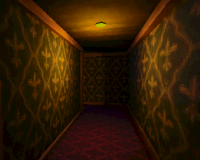
Advertisement
Lihiman
Lihiman is a narrative experiment that begins with simplicity and ends in quiet discomfort. Created by Kiwi Dreams, it places the player inside a small family home where nothing seems urgent or dramatic at first. You walk, listen, and observe. There are no enemies, no objectives flashing on the screen — only the feeling that you are witnessing something too ordinary to be real. Every interaction feels gentle, but the stillness carries a strange weight that slowly turns into suspicion.
A Home Built from Memory
The setting of Lihiman feels personal, almost nostalgic. The home is modest — a living room with soft light, a kitchen that hums with normal sounds, a family that seems content. Yet the deeper you explore, the more fragile this illusion becomes. The rooms begin to feel disconnected from time, as if they exist only to remind you of something forgotten. The player’s task is not to survive or escape, but to understand why everything feels so strangely incomplete.
Mechanics and Routine
Lihiman uses simple controls to keep focus on the atmosphere rather than difficulty. There are no scores or timers, only interaction through movement and observation.
- Walk through the house using the WASD keys
- Look around and study the environment with the mouse
- Press E to talk or interact with objects
- Use F to activate the flashlight in darker corners
These controls form the rhythm of the game — slow, repetitive, deliberate. The ordinary motions of walking and looking gradually become the tools of discovery. Through these small gestures, the player uncovers fragments of emotion and small shifts in tone that change how the story feels.
The Secret Beneath the Ordinary
The name Lihiman literally means “secret,” and the game carries that word like a heartbeat. Every smile in the dialogue, every pause between sentences, hints at something hidden. It’s not a horror game in the traditional sense — there are no monsters or jump scares — but rather an exploration of what makes ordinary life quietly terrifying. The fear lies in routine, in people pretending that everything is fine when something clearly isn’t.
In the end, Lihiman feels like a story told from behind closed doors. It invites you to step into a family’s calm world, to believe in its normality, and then to watch it gently unravel. The game’s strength is not in what it shows, but in what it allows the player to imagine. Every shadow, every sound, every silence carries the possibility of meaning. By the time it ends, you are left with the uneasy thought that maybe the house didn’t change at all — maybe you just learned to see it differently.












































































